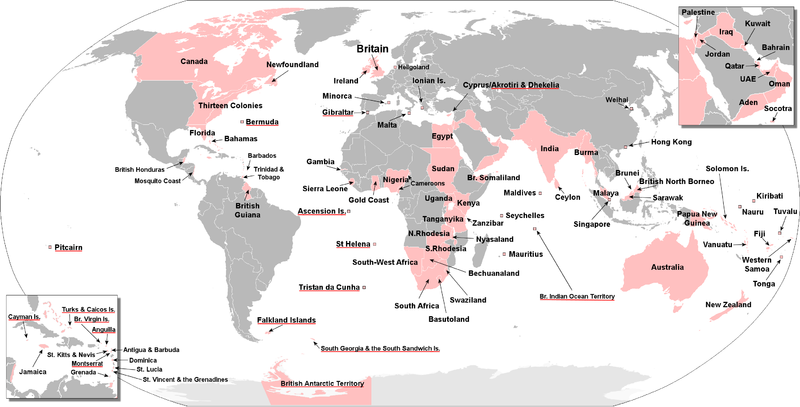
The Aftermath of World War I - Colonies with a New Status
In the peace negotiations after World War I in Versailles 1919, Germany was forced to surrender the country’s foreign territories to the allied forces. Britain, being one of them, gained colonies in Africa and these additions made the British Empire reach its peak in the early 1920s. However, the Empire had begun to disintegrate as the colonies with dominion status, Australia, Canada and New Zealand, had become independent in the first decades of the century. In 1931 The Commonwealth of Nations was founded by Britain, Australia, Canada, South Africa and Newfoundland to secure friendly, diplomatic and trade relations between the former colonies and the mother country.
World War II - East vs. West
But it was World War II that changed the world order profoundly. The emergence of the two new superpowers, the United States and the Soviet Union, changed the world’s power balance. In the tension that arose between the east and the west, the USA urged the colonial powers of the west, and particularly allied Britain, to get rid of their empire. The presumed anti-imperialistic stance created a new climate in the late 1940s and having colonies around the world did not fit the political agenda anymore. All of a sudden, Britain looked like a country of the past while America represented the future. Furthermore, maintaining the Empire became a costly affair for Britain, as finances were difficult after the war. Britain needed loans from America to invest in its own health and infrastructure, and hence money could not be ploughed into the far-flung empire.
The Aftermath of World War II - the Indian Example
When the Indian subcontinent regained its independence in 1947, it was divided into Pakistan (Muslim) and India (Hindu). Independence and partition created a domino effect and in 1957, Ghana, in West Africa, was the first African colony to become independent. Britain realised that it was only a matter of time before the British Empire disappeared and provided for the former colonies through the Commonwealth of Nations. In some colonies independence came quietly while in others there were periods of unrest and violence. In fact, many former colonies still grapple with political, economic and social instability. A example is modern day Nigeria.
The Commonwealth of Nations
It took centuries to build up the British Empire, even though the second empire came about rapidly from the late 19th to the mid-20th century. After World War II, decolonialisation also occurred swiftly, but the Commonwealth helped maintain the ties with the former colonies. Today, the Commonwealth consists of 54 member countries, all former colonies with the exception of Rwanda and Mozambique.
Britain, with a glorious past, was in the post-war period reduced to a medium-sized west European country, both in terms of influence and power.